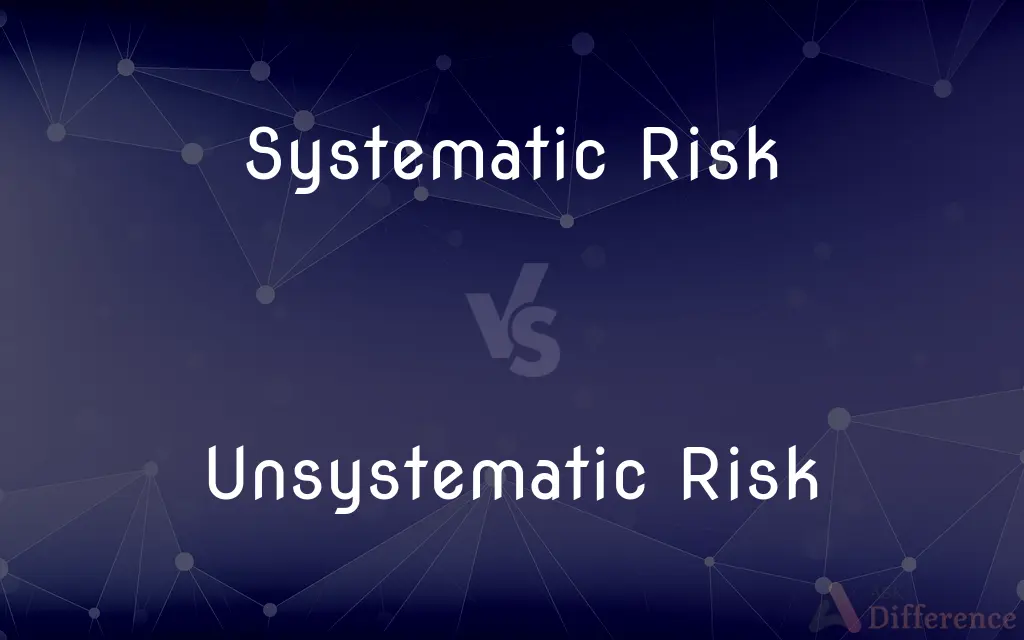Systematic Risk vs. Unsystematic Risk — What's the Difference?
Edited by Tayyaba Rehman — By Fiza Rafique — Published on January 9, 2024
Systematic Risk affects the entire market or economy, while Unsystematic Risk pertains to a specific company or industry.

Difference Between Systematic Risk and Unsystematic Risk
Table of Contents
ADVERTISEMENT
Key Differences
Systematic Risk refers to the risk inherent to the entire market or market segment. Such risks arise from macroeconomic factors that impact all businesses and investments, regardless of their nature. Examples of Systematic Risk include interest rate changes, inflation, or geopolitical events. Unsystematic Risk, on the other hand, is unique to a particular company or industry. This risk is associated with factors that directly impact an individual organization or its industry, but not the broader market.
The distinction between Systematic Risk and Unsystematic Risk is crucial for investors. By understanding these risks, investors can adopt strategies to mitigate potential losses. Diversification, for instance, can help reduce Unsystematic Risk, but it's less effective against Systematic Risk.
When considering investment, it's essential to evaluate both types of risks. While Systematic Risk is pervasive and often unavoidable, Unsystematic Risk can be minimized through thorough research and a diversified portfolio. In essence, while all investments carry some level of Systematic Risk due to overarching economic factors, the Unsystematic Risk is variable and depends on individual companies or sectors.
To illustrate, consider an economic recession. This downturn would represent Systematic Risk as it affects all sectors of the economy. In contrast, a product recall by a particular company due to quality issues would signify Unsystematic Risk, impacting that specific company but not the entire market.
Comparison Chart
Source of Risk
Macro-economic factors.
Company or industry-specific factors.
ADVERTISEMENT
Impact
Affects the entire market or economy.
Affects only a particular company or industry.
Mitigation
Cannot be eliminated through diversification.
Can be reduced or eliminated through diversification.
Examples
Changes in interest rates, geopolitical events.
Product recalls, management decisions.
Reliance on Diversification
Less effective against this risk.
Highly effective in reducing this risk.
Compare with Definitions
Systematic Risk
Systematic Risk is non-diversifiable.
Despite diversifying assets, the threat of Systematic Risk remains.
Unsystematic Risk
Unsystematic Risk results from individual factors.
An unexpected product recall poses an Unsystematic Risk to a company's stock value.
Systematic Risk
Systematic Risk affects all sectors.
Global political unrest can amplify Systematic Risk across all industries.
Unsystematic Risk
Unsystematic Risk varies between sectors.
Pharmaceutical companies might face Unsystematic Risks different from those in the retail sector.
Systematic Risk
Systematic Risk impacts the whole market.
Economic recessions can increase Systematic Risk for all investments.
Unsystematic Risk
Unsystematic Risk doesn't impact the entire market.
A scandal in one tech company might not influence the entire tech sector, indicating Unsystematic Risk.
Systematic Risk
Systematic Risk arises from broad factors.
Inflation rates contribute to the overarching Systematic Risk in an economy.
Unsystematic Risk
Unsystematic Risk is company-specific.
Poor management decisions can introduce significant Unsystematic Risk to a company.
Systematic Risk
Systematic Risk is unavoidable in investments.
No matter how diverse a portfolio, it still carries inherent Systematic Risk.
Unsystematic Risk
Unsystematic Risk can be diversified away.
Investing in multiple industries reduces exposure to Unsystematic Risk.
Common Curiosities
How is Unsystematic Risk different from Systematic Risk?
Unsystematic Risk is specific to a company or industry, while Systematic Risk impacts the whole market.
What is Systematic Risk?
It's the risk affecting the entire market due to macroeconomic factors.
Can diversification eliminate Systematic Risk?
No, Systematic Risk is non-diversifiable and affects all investments.
Which type of risk can be reduced through diversification?
Unsystematic Risk can be reduced or even eliminated through diversification.
Is inflation an example of Systematic or Unsystematic Risk?
It's an example of Systematic Risk, as it affects the broader economy.
Are market-wide crashes examples of Systematic Risk?
Yes, they impact the entire market and represent Systematic Risk.
Which risk is considered more unpredictable?
Unsystematic Risk can be more unpredictable due to its company-specific nature.
What's a typical source of Unsystematic Risk?
Company-specific events, like management changes or product recalls.
Can thorough research reduce Unsystematic Risk?
Yes, understanding a company or industry can help mitigate its specific risks.
Do all investments carry Systematic Risk?
Yes, all investments are subject to the broad economic factors represented by Systematic Risk.
Is a technology breakthrough in a sector an example of Unsystematic Risk?
Yes, it specifically impacts that sector and not the entire market.
Which risk is more controllable for an investor?
Unsystematic Risk is more controllable through research and diversification.
How does geopolitical unrest affect investments?
It introduces Systematic Risk, influencing markets globally.
Is a company's financial health a source of Systematic Risk?
No, it's a source of Unsystematic Risk specific to that company.
Why is it crucial for investors to understand these risks?
By understanding these risks, investors can adopt strategies to mitigate potential losses.
Share Your Discovery

Previous Comparison
dispose() in C# vs. finalize() in C#
Next Comparison
T-SQL vs. PL-SQLAuthor Spotlight
Written by
Fiza RafiqueFiza Rafique is a skilled content writer at AskDifference.com, where she meticulously refines and enhances written pieces. Drawing from her vast editorial expertise, Fiza ensures clarity, accuracy, and precision in every article. Passionate about language, she continually seeks to elevate the quality of content for readers worldwide.
Edited by
Tayyaba RehmanTayyaba Rehman is a distinguished writer, currently serving as a primary contributor to askdifference.com. As a researcher in semantics and etymology, Tayyaba's passion for the complexity of languages and their distinctions has found a perfect home on the platform. Tayyaba delves into the intricacies of language, distinguishing between commonly confused words and phrases, thereby providing clarity for readers worldwide.














































